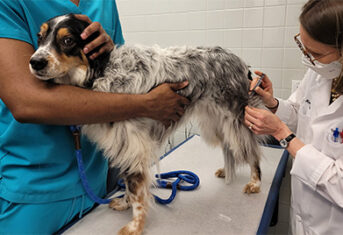Kennel Cough: A Common Condition with Many Causes

Kennel Cough: A Common Condition with Many Causes
Macbeth, my extra cute Westie puppy patient, came in last week with a persistent cough. I noted a runny nose, but no fever or loss of appetite. When I examined him, he easily coughed if I palpated his windpipe. He had previously been vaccinated against canine influenza, Bordetella and distemper-parvovirus ahead of a stay at a boarding kennel over the holidays. Even though he was vaccinated against frequent respiratory infections, I still diagnosed kennel cough, a common condition with many causes.
Coughing but no kennel
Kennel cough is the lay term for the medical conditions canine infectious respiratory disease or infectious tracheobronchitis. Aptly named, kennel cough spreads rapidly in kennels where many coughing and sneezing dogs spread the infection to others. Kennel cough is not limited to dogs in kennels, however. Doggie day care, dogs shows, dog parks and veterinary hospitals can be sources of the organisms that cause kennel cough. McBeth had not been to a kennel in weeks and not to the dog park either. Why did I diagnose kennel cough in Macbeth?
Many causes, one clinical picture
Many different infectious agents can cause kennel cough syndrome, but Macbeth had been vaccinated against the most common culprits, including Bordetella, canine influenza, distemper, adenovirus and parainfluenza virus. These are part of a puppy’s “core” vaccines that veterinarians recommend all dogs receive.
But there are more microorganisms that can cause kennel cough, including canine respiratory coronavirus, herpes virus, Streptococcus zooepidemicus and Mycoplasma. There are no vaccines to prevent these infections, and I suspect Macbeth had picked up one of these bugs somewhere and they were the source of his cough.
Treatment of kennel cough
While the clinical signs of kennel cough syndrome are unmistakable, the cause is typically elusive due to the wide variety of viruses and bacteria that may be responsible. Fortunately, identification is usually not imperative since most dogs recover on their own without treatment. Veterinarians treat kennel cough when it progresses to pneumonia, if the patient has a fever or an elevated white blood cell count.
As for Macbeth, he did develop a bit of pneumonia and a week of antibiotics made him as good as new.































